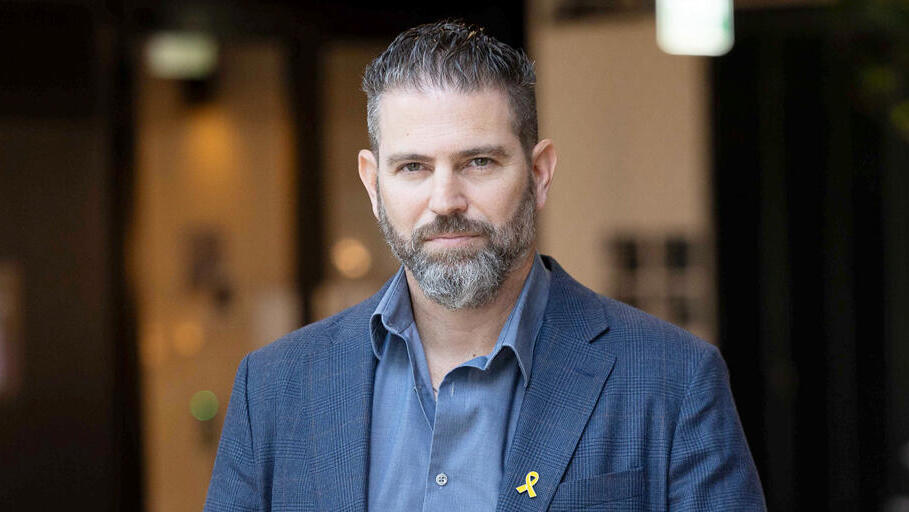
Microsoft Israel GM: ‘In the AI era, success no longer means more employees’
Alon Haimovich on Copilot, AI agents, and why Microsoft cut 9,000 jobs despite booming AI and cloud growth.
In the midst of historic growth and rapid technological advances, Microsoft is redefining its identity. No longer content to be simply a software company, it is positioning itself as an “intelligence engine” for organizations worldwide. This transformation, driven by breakthroughs in cloud computing and AI tools like Copilot, comes even as the company has undergone significant restructuring, laying off 9,000 employees globally earlier this year.
In an interview with Calcalist, Alon Haimovich, Israel Country Manager at Microsoft, explains why the AI era demands new skills, how autonomous AI agents are reshaping industries, and why Israel should focus on talent and collaboration instead of competing with tech superpowers on infrastructure.
Alon Haimovich, Israel Country Manager at Microsoft, how do you explain that Azure, Microsoft’s cloud service, and AI technologies like Copilot and iGentic are boosting the company, and yet Microsoft worldwide laid off a whopping 9,000 employees in May and June of this year?
"Microsoft is a company of enormous size, with meteoric growth on the one hand, that has decided to make adjustments to its workforce. Saying goodbye to employees is always difficult, but in an email sent at the end of July, Satya Nadella essentially said that in the age of artificial intelligence, the old equation, business success equals more employees, needs rethinking. It’s a dramatic paradigm shift. It’s like saying, ‘The king has no clothes.’"
Nadella’s letter explained why Microsoft was reducing headcount despite strong business performance, outlining a new worldview for the AI era. The company no longer seeks to be just a seller of software products, but an intelligence engine for its customers.
"I have no doubt we’ll see more organizations go through this kind of structural change, closing departments that don’t contribute to growth, and adding employees in areas where they want to expand. There’s an opportunity here: employees who are curious and willing to learn new, relevant tools will thrive, while those focused on routine, repetitive tasks may find their roles disappearing. Others, however, will grow."
Related articles:
How does Microsoft want to transform itself from a software company to an AI engine for customers?
"Until now, big tech companies invested heavily in cutting-edge infrastructure so customers could run their own generative AI tools. Now, we want to differentiate ourselves by becoming the platform for companies, organizations, and startups to build exactly the AI tools they need for their own purposes. That’s the transformation."
Anyone who doesn’t contribute to the AI revolution is in danger of losing their job?
"Both they and their employers are at risk. The required skill set today is very different from before. Microsoft still has over 220,000 employees, but now, every one of them, when preparing a business plan, is expected to know how to use an AI agent to generate quotes, boost sales using AI, and identify duplication of work that might make certain roles redundant."
What happened in Israel in the global wave of layoffs? Are there more new jobs or more layoffs?
"Saying goodbye to employees is never easy, but in terms of the overall balance, we came out of this round of layoffs in a strong position. I won’t get into specific numbers, but Microsoft Israel’s business arm is one of the fastest growing in the world, and Microsoft continues to invest in it."
You demonstrated a voice conversation with Microsoft’s Copilot for our interview, AI software that sounds like a friendly colleague. What’s the idea?
"It’s about showing a practical AI application. I can have these conversations with Copilot on my way to a meeting in any field and prepare en route. I just used the professional version, but there’s also a simpler version in the browser. Copilot can help with more complex meetings too. For example, if I’m moderating a panel with several funds from different industries, I can ask: ‘How do I involve everyone in the discussion? What’s the story that will connect them, and which question should I ask when and to whom?’"
"Today there’s also a ‘Security Copilot’ that can help a beginner analyst easily identify where to start investigating a security breach and improve their abilities. This applies to every field."
Does it help with that too?
"It’s similar to what ChatGPT does, we have a conversation, develop it into text and voice, but it’s not autonomous. You ask a question and get an answer. An AI agent is one step further. For example, I can say: ‘Plan me a trip to Greece with a beachfront villa, authentic food, and minimal tourists. Book the flights and hotels.’ The agent doesn’t just answer, it executes the plan, step by step, with my feedback, until it’s done."
"That opens up endless applications where you’re not just asking for information or content, but the AI acts on your behalf. Let’s say: ‘Apply for National Insurance on my behalf and complete the process by the end of the day.’ Or: hire a new employee, assign them a phone, car, salary, and workspace. The agent does it autonomously. Is it scary? Maybe, but it’s also full of opportunities."
Where is such technology being applied, for example?
"One example is mental health in Israel since October 7. There can be 1,000 potential patients for every psychiatrist, and many can’t even get an initial consultation. The Ministry of Defense and the Rehabilitation Division are already using Mentaily, developed with Sheba Medical Center and based on Microsoft technology, to run an initial triage conversation through LIV, an AI tool that classifies urgency and is now built into the process of requesting recognition for a condition."
The Nagel Committee’s conclusions on accelerating AI in Israel recommend investing 25 billion shekels over five years, including 18 billion in building an Israeli AI language model.
"Spending 18 billion shekels on supercomputing won’t make the difference. Israel has an opportunity to leap forward in every field thanks to AI, and we already have 2,000 AI-based startups out of 7,000 total. The government’s role is to enable and accelerate. But we must recognize what we do best, and what’s better left to others. Israel isn’t China or the U.S., and we don’t have the budget to compete on superpower-scale AI infrastructure. Instead, we should give our research community and startups access to the world’s most advanced AI platforms through partnerships with the largest global companies."
Why?
"Because Israel can’t match the investment levels of companies like Microsoft, which spends $80 billion a year on AI infrastructure. The big tech firms together invest over $300 billion annually. Israel can’t compete at that scale, nor should it. It’s better to leverage their platforms. We manage over 1,900 language models ourselves. Building a supercomputer in Israel is important, but by the time it’s ready, the technology will have already moved on."
What else will help Israel move forward?
"Talent development. We need training programs, from schools to professional courses, to prepare developers for building advanced technologies. And we must raise cyber awareness. Israel is a target for major cyberattacks, and AI increases the risks. We have to ensure AI is developed securely and responsibly so it doesn’t cause harm."
Microsoft is spending a lot of money on AI. When will it pay off?
"I feel the benefits already. But when you invest $80 billion in AI, the return isn’t immediate. AI success requires massive investment, and it’s an evolution, not a quick win. Over time, it will pay for itself."
Tell us about your own path, from a technician at Bynet in Kiryat Motzkin to a senior Cisco executive, and now Country Manager at Microsoft Israel.
"I started as a technician driving a Kangoo van, soldering sockets into walls. This was before most people knew what the internet was. I’m not the smartest person in the room, but I’m obsessed with success, love learning, face challenges head-on, and work hard. That took me from technology into sales. I was VP of Technology at Cisco for many years, then moved into business leadership, and here I am."
What do you look for in employees?
"A manager shouldn’t be a know-it-all or emotionally detached. I believe your employees should be better than you. My advantage is seeing the future more clearly than others and breaking it into clear steps. I need to know who I can learn from to make it work."
How does that show up in a job interview?
"When I interviewed my CTO, he began explaining cybernetics in detail. I stopped him and said: ‘Now explain it to your grandmother in three sentences.’ Why? Because in our world, communication must be clear and impactful, otherwise it’s ineffective."
What do you need to achieve before thinking about your next role?
"I approach every job as if it’s my last, even when I was an installation technician. Microsoft Israel is one of the fastest-growing sites in the company worldwide. My goal is to keep that momentum going through one of the biggest revolutions of our time. That excites me."
